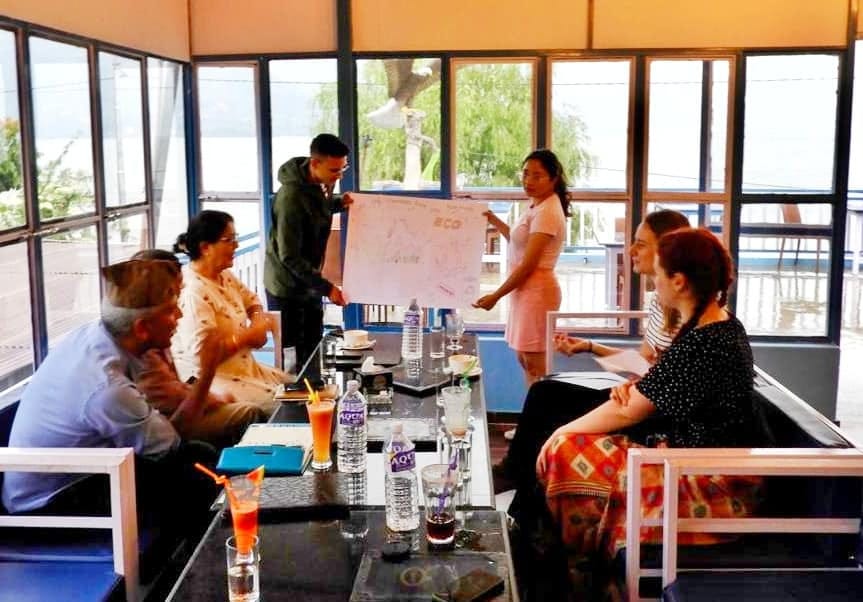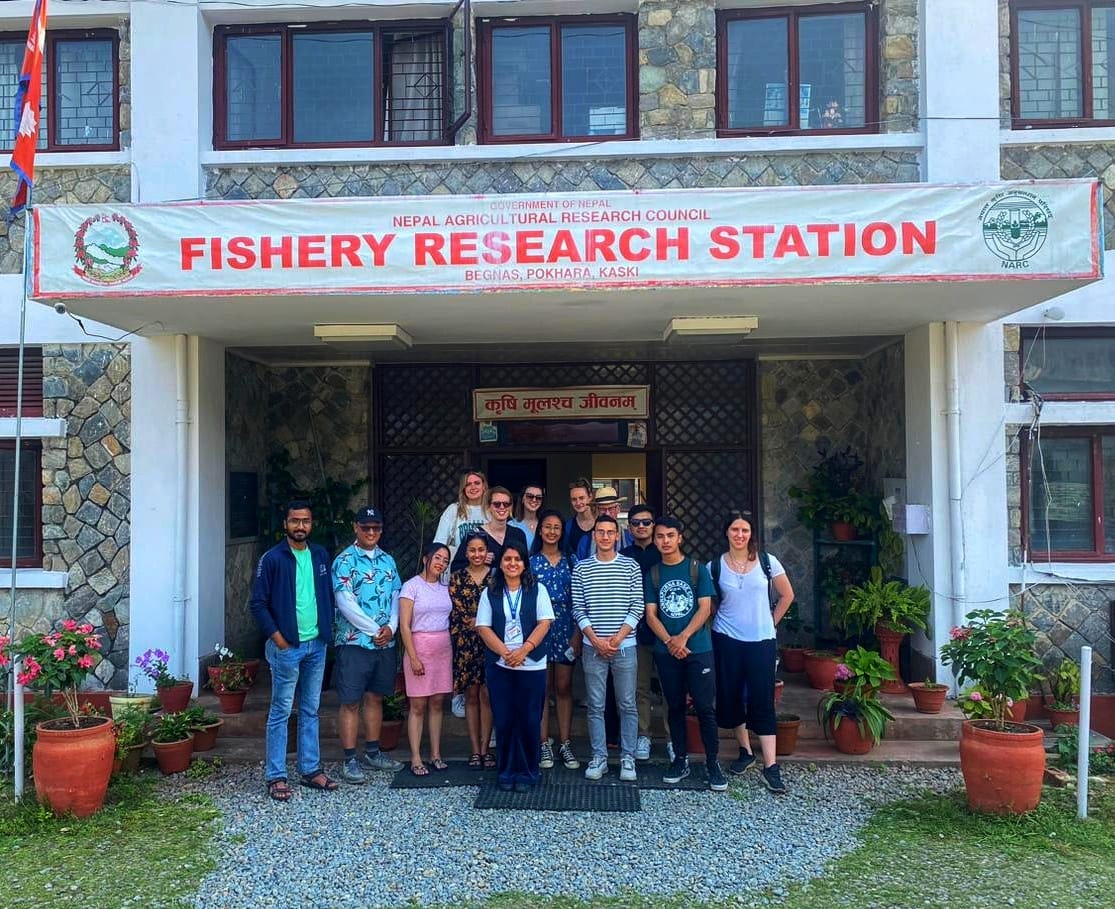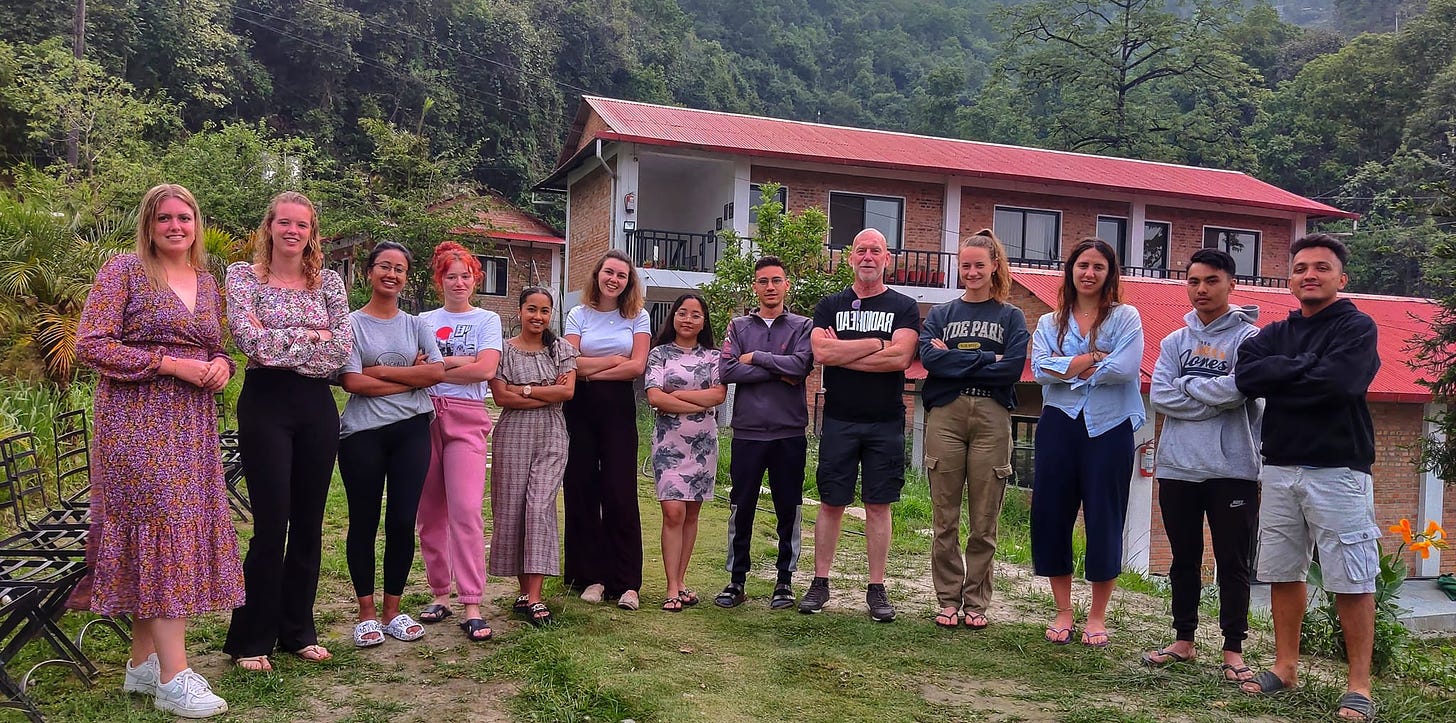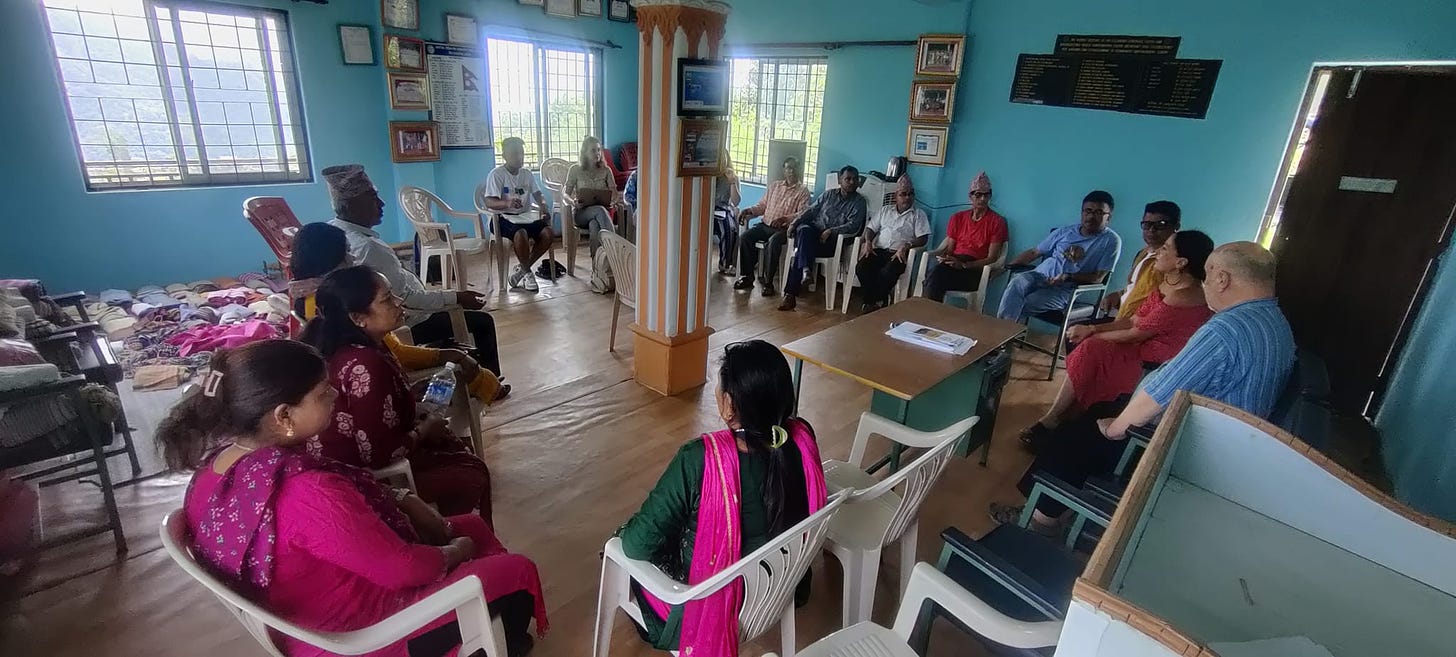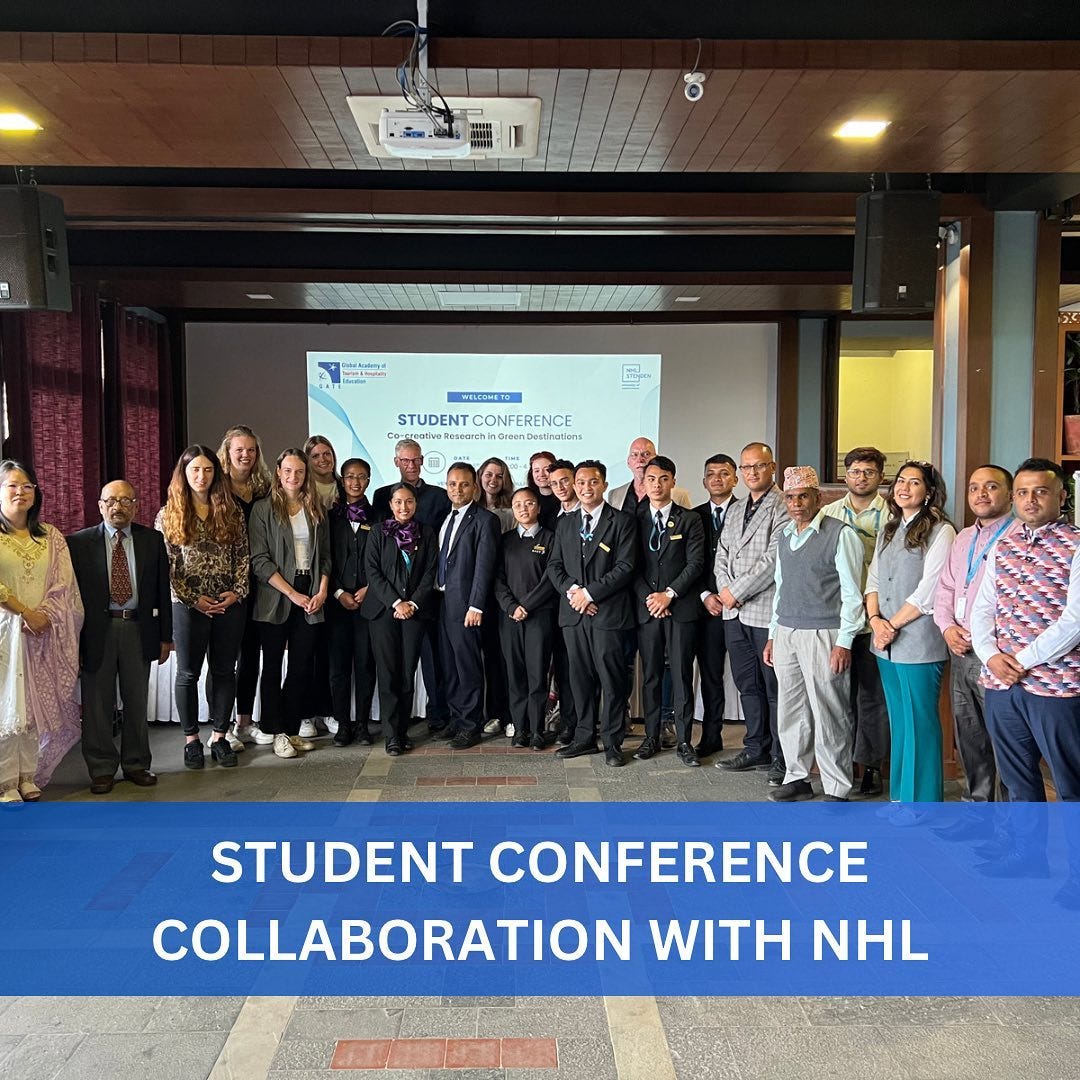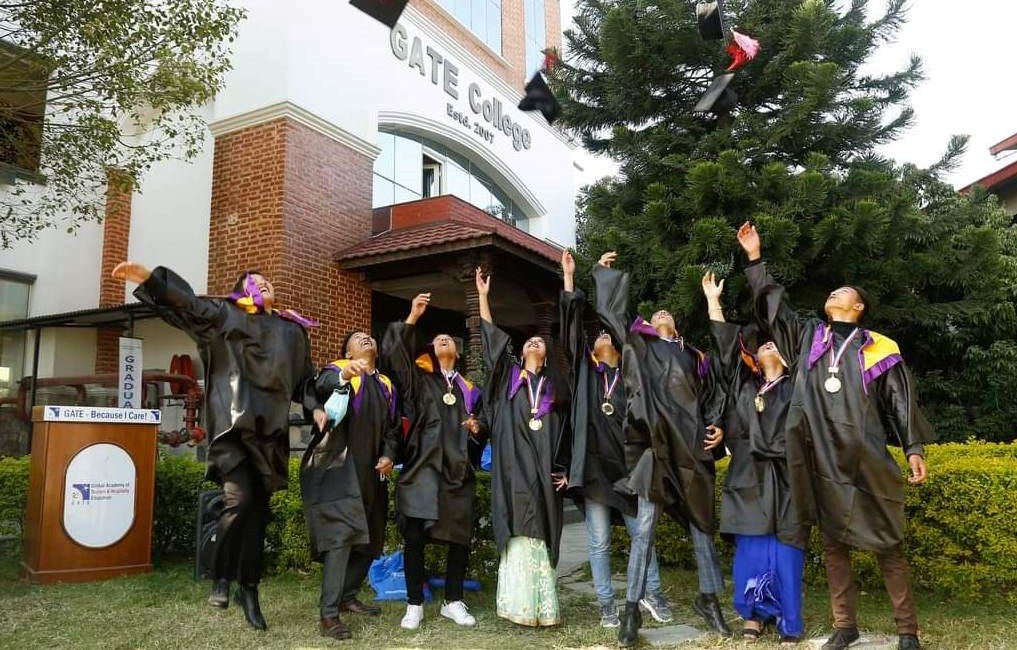Cross-Cultural Communication for Sustainable & Regenerative Tourism
This is the 2nd Article in the Sustainability Series
Visit the Evidence Files Facebook and YouTube pages; Like, Follow, Subscribe or Share!
NHL Stenden University of Applied Sciences is located in Leeuwarden, Netherlands. A truly international school, it partners with institutes as far away as South Africa. One of its partnerships includes the Global Academy of Tourism and Hospitality Education (GATE College) in Nepal. About one month ago, a team of six master students and their supervisor, Senior Lecturer Martin Groters, traveled to Nepal to engage in research on the development of sustainable communities and regenerative tourism. Joining forces with six students from GATE College, their research took them all around the Kathmandu Valley, to the hills of Pokhara, and along the Annapurna trek. The six NHL Stenden students were Niki Gáspár, Mette Kamerling, Anniek Mosterd, Maud Bos, Vera Markgraf, and Christina Panagiotopoulou. From GATE, the students were Shiwani Thapa, Vishma K.C., Sujan Koirala, Swechchha Bajracharya, Aabhishkar Lama, and Sushmita Rajbanshi. Broken up into groups of four, each focused on particular aspects of sustainability.
Gáspár, Kamerling, Koirala, and Bajracharya examined what they called “soft trekking.” A significant portion of tourist visits to Nepal involve trekking in Nepal’s miraculous countryside. Unfortunately, events of the last decade have endangered the industry as it currently exists. Despite the severe drop-off in tourist numbers during the COVID era, many of the trekking routes in Nepal are straining under ever-growing numbers of visitors. More people means more garbage left behind and increased environmental damage, which poses risks to the pristine nature of the routes and to the tourism industry in general. Soft trekking encapsulates the idea of traversing Nepal’s trekking routes while leaving little to no footprint of one’s presence. While local operators of trekking companies and lodgings cannot fully control what visitors do while there, they can take some responsibility in managing the after-effects.
The strategy with which the student researchers approached these problems did not consist of simply identifying issues and then telling locals what to do. Rather, they pursued a stakeholder-centered methodology. This meant meeting with locals whose livelihoods depend on finding successful solutions, to talk about their concerns, strategies, and hopes for the future. The idea was for the NHL Stenden and GATE students to bring some fresh perspectives into the discussion to give these stakeholders more options and added creativity in implementing their plans. Some of the concepts proposed include the planting of new trees, increasing waste management efforts, and implementing educational digital marketing to entice tourists, but imbue them with some principles related to sustainability. Working in coordination with GATE College’s vocational school in Pokhara, this group collaborated with stakeholders from Three Sisters Trekking, the Nepal Tourism Board Pokhara, the Annapurna Conservation Area Project, and the Trekking Agencies Association Nepal Pokhara Chapter.
The second group focused on sustainable fishing in Majhikuna. This group included Bos, Mosterd, Rajbanshi, and Lama. The key issue they examined was a reduction in native fish due, in part, to an invasive species the locals call “glass fish.” They also considered the degrading water quality of lakes around Pokhara. Glass fish might refer to tilapia, a species whose prolific reproduction has threatened the diversity of Pokhara’s primary lake, Phewa, as well as others, including Begnas Lake. Tilapia represent one of many invasive species, however, which cumulatively make up the majority of fish in Pokhara’s lakes now. To gain a comprehensive understanding of the current state of fish farming and the government's support for its promotion, the team visited the Fishery Research Center. Among the ideas the group discussed, one involved increasing fish farming of native species. Research indicates that the farming of non-native fish has fed their increasing numbers in adjacent waterways as a result of leakage caused by seasonal flooding. Farming native species could follow the same trajectory leading to their population growth in local water bodies.
Solving the water quality problem may be quite a bit more difficult. The group proposed creating communal clean-up crews, which undoubtedly will improve the situation. But Phewa lake suffers from a more challenging pollutant: microplastics. Still, the students of every group had suggested decreasing plastic use among their stakeholders, such as the ubiquitous offering of plastic bottles at nearly every tourist institution. Decreased production and use of plastics generally will help at least some with the reduction in microplastics, which inevitably find their way into local waterways.
The Team at GATE’s Pokhara campus.
Another group, comprising Vishma K.C., Markgraf, Panagiotopoulou, and Thapa, examined Food and Homestay businesses. The group met thirteen stakeholders from these types of business in Pachabhaiya, Nepal, to discuss issues and brainstorm on potential solutions. Businesses included coffee and orange farmers, honey cultivators, and owners of homestays. Like most tourist businesses across the globe, stakeholders noted that the COVID pandemic originally decreased numbers of tourists, but numbers have risen significantly since the re-opening. As seems to be the case in much of Nepal, the uptick in numbers is driven primarily by local tourists, with international visitors coming at dramatically lower rates. Similarly to the trekking companies, these stakeholders sought ideas for improving their reach to international tourists through digital marketing.
The local community has not remained idle in the face of these challenges. Local organizations have initiated cleaning campaigns to improve the environment, and the Social Educational Environmental Development (SEED) Foundation has provided support to repair or build-new dozens of schools in the area. Two areas where the NHL Stenden-GATE team provided specific ideas included in digital marketing, and planning of a local monkey park. On digital marketing, the group discussed strategies for more efficiently employing social media, inviting “influencers,” and conducting creative contests which would provoke engagement by local stakeholders, community members, and even children to create promotional material. Establishing a monkey park was proposed to help solve the issue of a local population of monkeys that often engage in nuisance activities, such as stealing food or creating health hazards. The team presented a sample of fruit-bearing plants to be planted in the designated monkey park—an innovative concept—aimed at keeping the monkeys within the park boundaries and minimizing unnecessary interactions with the village. This initiative was made possible thanks to the valuable contributions and cooperation of various stakeholders. Setting aside a conservation area would help reduce potential threats posed by a growing population of monkeys without having to adopt any harmful measures against them.
This year’s collaborative in Nepal represented the pilot program for what Professor Groters expects will become an annual project for NHL Stenden University students. Future groups will visit Nepal and other destinations to offer their insights into promoting and instituting greener, more sustainable practices in the tourism and hospitality industry. Already, Professor Groters has signed and continues to pursue the signing of more Memoranda of Understanding with universities worldwide. Not only does this program encourage facilitating more effective practices, but it provides a critical education in cross-cultural learning and problem solving. NHL Stenden University already enjoys a wildly diverse student population, hailing from dozens of European countries, and elsewhere. Directly engaging with local students who have their own stake in the success of the communities researched only furthers this much-needed mutual understanding and cooperation. The program provides a spectacular example for other universities, research groups, and the public at large.
GATE College and NHL Stenden are showing the intrinsic value in international cooperation on achieving solutions to the world’s growing environmental crisis. Serious problems need redress, and these two institutions are a model for the rest of the world on how to proceed. This is the second installment in my series on sustainability in tourism, hospitality, education, and agriculture. To read the first article, see below. If you wish to become involved in sustainable activities, or wish to learn more about either of these educational institutions, feel free to comment below or reach out to me on any of my social media linked below.
***
I am a Certified Forensic Computer Examiner, Certified Crime Analyst, Certified Fraud Examiner, and Certified Financial Crimes Investigator with a Juris Doctor and a Master’s degree in history. I spent 10 years working in the New York State Division of Criminal Justice as Senior Analyst and Investigator. Today, I teach Cybersecurity, Ethical Hacking, and Digital Forensics at Softwarica College of IT and E-Commerce in Nepal. In addition, I offer training on Financial Crime Prevention and Investigation. I am also Vice President of Digi Technology in Nepal, for which I have also created its sister company in the USA, Digi Technology America, LLC. We provide technology solutions for businesses or individuals, including cybersecurity, all across the globe. I was a firefighter before I joined law enforcement and now I currently run a non-profit that uses mobile applications and other technologies to create Early Alert Systems for natural disasters for people living in remote or poor areas.
Find more about me on Instagram, Facebook, Twitter, LinkedIn, or Mastodon. Or visit my EALS Global Foundation’s webpage page here.




